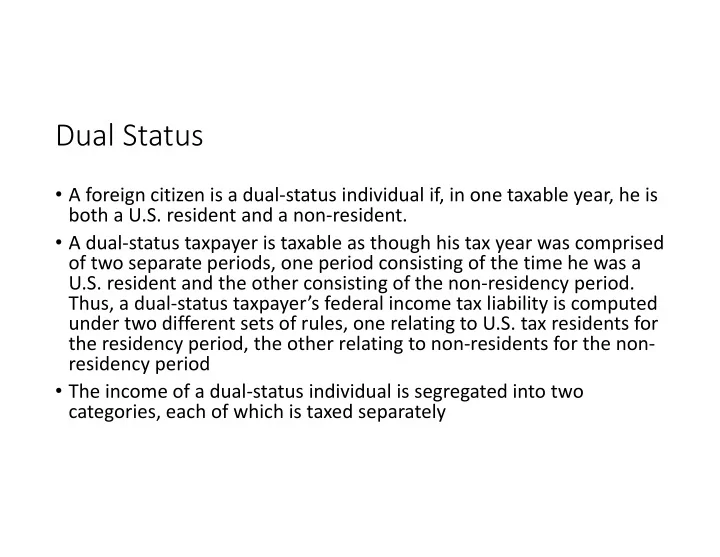

Dual Status • A foreign citizen is a dual ‐ status individual if, in one taxable year, he is both a U.S. resident and a non ‐ resident. • A dual ‐ status taxpayer is taxable as though his tax year was comprised of two separate periods, one period consisting of the time he was a U.S. resident and the other consisting of the non ‐ residency period. Thus, a dual ‐ status taxpayer’s federal income tax liability is computed under two different sets of rules, one relating to U.S. tax residents for the residency period, the other relating to non ‐ residents for the non ‐ residency period • The income of a dual ‐ status individual is segregated into two categories, each of which is taxed separately
Dual Status – Restrictions • You cannot use the standard deduction. However, you can itemize certain allowable deductions. • Special rules apply for exemptions for the part of the tax year when a dual status taxpayer is a non ‐ resident alien if the taxpayer is a resident of Canada, Mexico, The Republic of Korea (South Korea), a U.S. national, or a student or business apprentice from India. Refer to Aliens ‐ How Many Exemptions Can Be Claimed. • Subject to the general rules for qualification, you are allowed exemptions for your spouse and dependents in figuring taxable income for the part of the year you were a resident alien. • Your total deduction for the exemptions for your spouse and allowable dependents cannot be more than your taxable income (determined without deducting personal exemptions) for the period you are a resident alien. • Single taxpayers cannot use the head of household status. • You cannot file a joint return (However, a dual status alien who is married to a U.S. citizen or a resident alien may elect to file a joint return with his or her spouse. • If you are a non ‐ resident alien and married to a U.S. citizen or resident alien for all or part of the tax year, and you do not choose to file jointly with your spouse, you must use “married filing separately” to figure your tax. You cannot use “married filing jointly” or “single”.
Dual Status Non ‐ resident at End of Year • You must file Form 1040NR, U.S. Nonresident Alien Income Tax Return if you are a dual ‐ status taxpayer who gives up residence in the United States during the year and who is not a U.S. resident on the last day of the tax year. Write "Dual ‐ Status Return" across the top of the return. Attach a statement to your return to show the income for the part of the year you are a resident. You can use Form 1040, U.S. Individual Income Tax Return as the statement, but be sure to mark "Dual ‐ Status Statement" across the top. Resident Alien at End of Year • You must file Form 1040, U.S. Individual Income Tax Return, if you are a dual ‐ status taxpayer who becomes a resident during the year and who is a U.S. resident on the last day of the tax year. Write "Dual ‐ Status Return" across the top of the return. Attach a statement to your return to show the income for the part of the year you are a non ‐ resident. You can use Form 1040NR, U.S. Nonresident Alien Income Tax Return as the statement, but be sure to mark "Dual ‐ Status Statement" across the top.
Dual Status • Dual ‐ status individual may be able to invoke the tie ‐ breaker provision in an income tax treaty to be treated as a non ‐ resident during the pre ‐ arrival or post ‐ departure period, if the individual would otherwise be a resident of both the United States and the other treaty country during such period
Recommend
More recommend